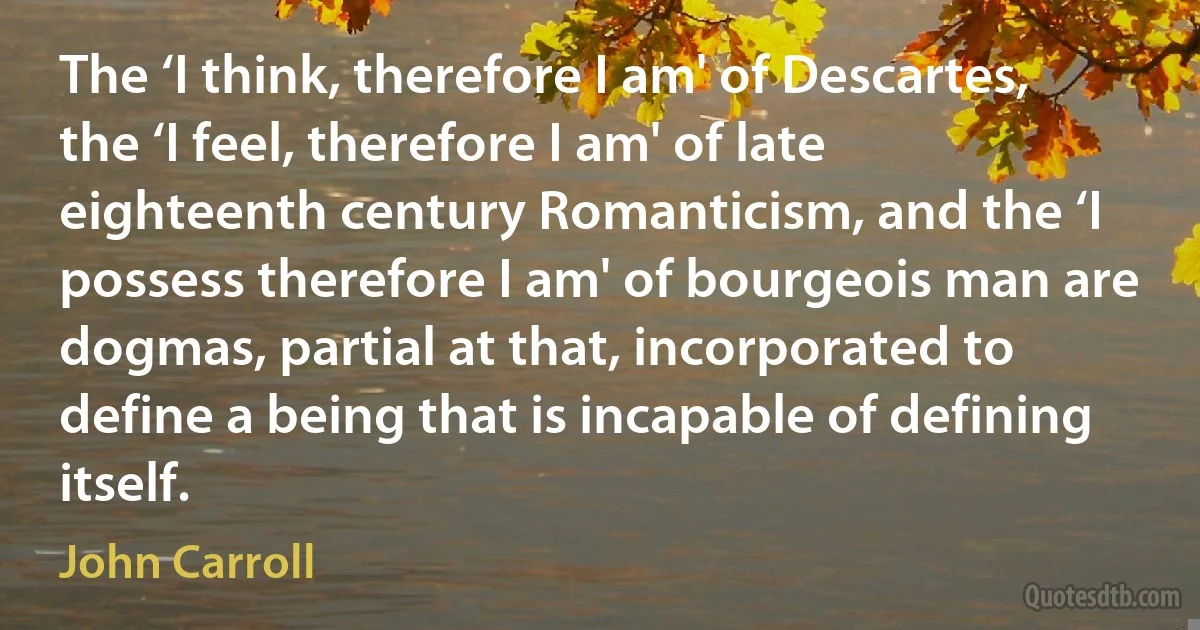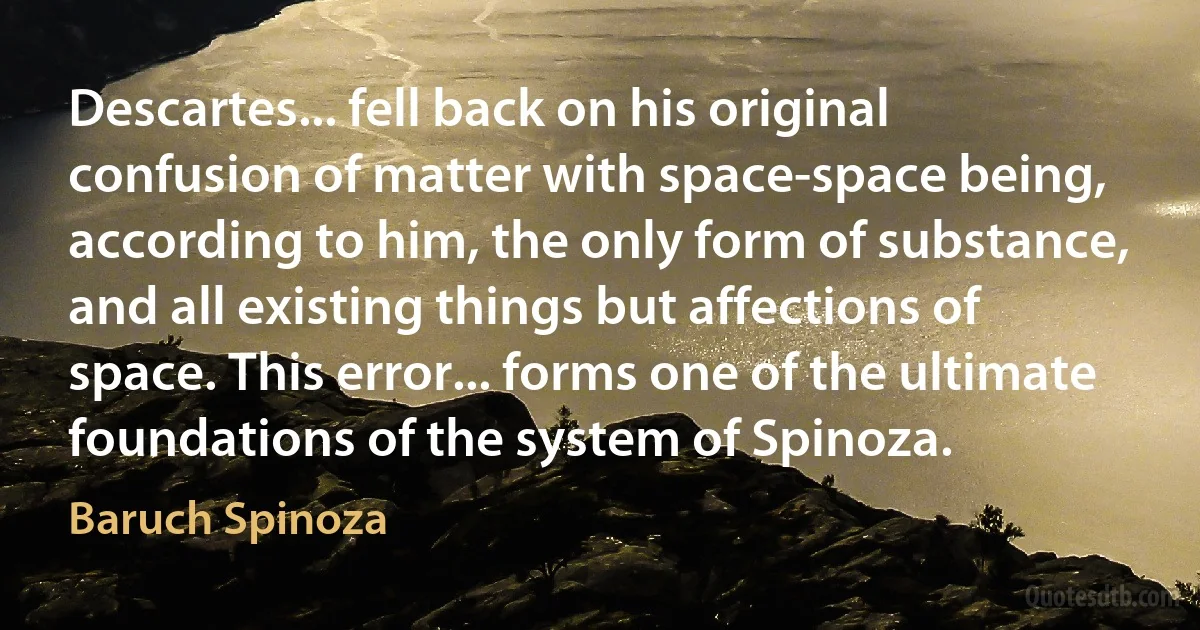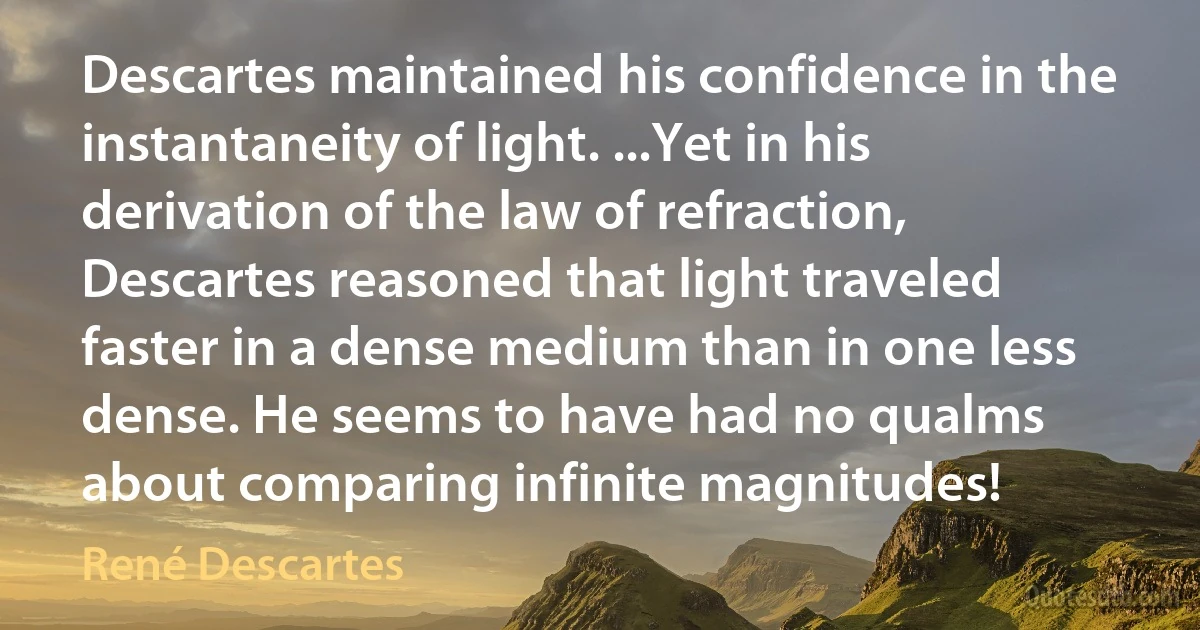Descartes Quotes - page 4
The story of the brain's separation from the body begin with Rene Descartes. The most influential philosopher of the seventeenth century, Descartes divided being into two distinct substances: a holy soul and a mortal carcass. The soul was the source of reason, science, and everything nice. Our flesh, on the other hand, was "clock-like," just a machine that bleeds. With this schism, Descartes condemned the body to a life of subservience, a power plant for the brain's light bulbs.

Jonah Lehrer
In 1665 Wallis published the first systematic treatise on Analytical conic sections. Analytical geometry was invented by Descartes and the first exposition of it was given in 1637: that exposition was both difficult and obscure, and to most of his contemporaries, to whom the method was new, it must have been incomprehensible. Wallis made the method intelligible to all mathematicians. This is the first book in which these curves are considered and defined as curves of the second degree and not as sections of a cone.

John Wallis
Galileo is the founder of the science of dynamics. Among his contemporaries it was chiefly the novelties he detected in the sky that made him celebrated, but Lagrange claims that his astronomical discoveries required only a telescope and perseverance, while it took an extraordinary genius to discover laws from phenomena, which we see constantly and of which the true explanation escaped all earlier philosophers. The first contributor to the science of mechanics after Galileo was Descartes.

Galileo Galilei
Neither Montaigne in writing his essays, nor DesCartes in building new worlds, nor Burnet in framing an antedeluvian earth, no nor Newton in discovering and establishing the true laws of nature on experiment and a sublimer geometry, felt more intellectual joys; than he feels who is a real patriot, who bends all the force of his understanding, and directs all his thoughts and actions, to the good of his country.

Henry St John, 1st Viscount Bolingbroke
He flew through the nets of Judaism, Calvinism, Aristotelianism and the Cartesian dualism, but nevertheless Descartes was his starting point. Could he have become Spinoza without Descartes? Did he beget himself, as Socrates did, or even as Hobbes largely was self-generated? Spinoza's "Nature or God" is not one of the Cartesian formulations, but Spinoza relies upon a number of Cartesian concepts.

Baruch Spinoza
From Descartes and Malebranche onward, the metaphysical value of the "idea” or archetype steadily deteriorated. It became a "thought,” an internal condition of cognition, as clearly formulated by Spinoza: "By 'idea' I understand a conception of the mind which the mind forms by reason of its being a thinking thing.” Finally Kant reduced the archetypes to a limited number of categories of understanding.

Baruch Spinoza
Neutrality toward Spinoza set in once one was able to admit that the "modern worldview," whose victory was decisively aided by Spinoza's metaphysics, does not, or does not entirely, coincide with this metaphysics. But even at this stage it was still generally maintained, and even emphasized, that among the three great Western philosophers of the seventeenth century - Descartes, Hobbes, and Spinoza - Spinoza was the most important one because, he was the most progressive one. He alone had drawn certain consequences from the foundations of modern philosophy, which became fully clarified only in the nineteenth century and which henceforth determined the general consciousness.

Baruch Spinoza
He [Nicolas Malebranche] cannot give up the principles which the Catholic Church imposes on him. He carries forward that process of rationalisation in Christian ethics which Descartes began, and which, like the attempt to restore an older theology, finds its fulfilment in Spinoza. It is Spinoza who is the first to create a wholly metaphysical ethics, free from all trace of its theological origin. Spinoza thus completes for continental ethics the separation between morality and religion which English empiricism, in spite of many relapses, had effected under the leadership of Bacon.

Baruch Spinoza
Positive philosophy made its counter-attack against critical rationalism on two fronts. Comte fought against the French form of negative philosophy, against the heritage of Descartes and the Enlightenment. In Germany, the struggle was directed against Hegel's system. Schelling received an express commission from Frederick William IV ‘to destroy the dragon seed' of Hegelianism, while Stahl, another anti-Hegelian, became the philosophical spokesman of the Prussian monarchy in 1840.

Herbert Marcuse
Above all, Rousseau is the explorer of that dark continent, the modern self. It is no surprise that he wrote one of the most magnificent autobiographies of all time, his Confessions. Personal experience starts to take on a significance it never had for Plato or Descartes. What matters now is less objective truth than truth-to-self – a passionate conviction that one's identity is uniquely precious, and that expressing it as freely and richly as possible is a sacred duty. In this belief, Rousseau is a forerunner not only of the Romantics, but of the liberals, existentialists and spiritual individualists of modern times.

Jean-Jacques Rousseau
As in reply to the skeptic or agnostic, who asserts in despair that there is no absolute truth. The dialectician retorts: Then at least your own assertion must be absolutely true. There must be some absolute truth, for you cannot assert that there is none without self-contradiction. As in Descartes' case, the doubter is reminded of himself. There, in his own assertion, is a certainty from which he cannot escape.
This turn of thought which reminds the enquirer of himself, we shall call the reflexive turn. It reappears in all discoveries of the Absolute. It is clinching--but is likely to disappoint, even as Descartes' result disappoints. For the skeptic finds that he also was in search of objective truth: and that the absolute truth of his statement is irrelevant to his quest. Whence his skepticism toward objective truth remains unanswered.

William Ernest Hocking
My philosophical views approach somewhat closely those of the late Countess of Conway, and hold a middle position between Plato and Democritus, because I hold that all things take place mechanically as Democritus and Descartes contend against the views of Henry More and his followers, and hold too, nevertheless, that everything takes place according to a living principle and according to final causes - all things are full of life and consciousness, contrary to the views of the Atomists.

Gottfried Leibniz
The great invention... Descartes gave to the world, the analytical diagram, ...gives at a glance a graphical picture of the law governing a phenomenon, or of the correlation which exists between dependent events, or of the changes which a situation undergoes in the course of time. ...the invention of Descartes not only created the important discipline of analytic geometry, but it gave Newton, Leibnitz, Euler, and the Bernoullis that weapon for the lack of which Archimedes and later Fermat had to leave inarticulate their profound and far-reaching thoughts.

René Descartes
It should be remembered that it was Descartes who systematised our Mathematical notation. He used the letters at the end of the alphabet as variables, and those at the beginning as constants, and he brought into general use our present system of indices. He also introduced the method of indeterminate co-efficients for the solution of equations.

René Descartes
The implications of Descartes' analytic reformulation of geometry are obvious. Not only did the new method make possible a systematic investigation of known curves, but, what is of infinitely greater significance, it potentially created a whole universe of geometric forms beyond conception by the synthetic method.
Descartes also saw that his method applies equally as well to surfaces... but he did not develop this. With the extension to surfaces, there was no reason why geometry should stop with equations in three variables; and the generalization to systems of equations in any finite number of variables was readily made in the nineteenth century. Finally, in the twentieth century, the farthest extension possible in this direction led to spaces of a non-denumerable infinity of dimensions. ...The path from Descartes to the creators of higher space is straight and clear; the remarkable thing is that it was not traveled earlier than it was.

René Descartes
Descartes, I think, broke with this when he said, "To accede to truth, it suffices that I be any subject that can see what is evident." Evidence is substituted for ascesis at the point where the relationship to the self intersects the relationship to others and the world. The relationship to the self no longer needs to be ascetic to get into relation to the truth. It suffices that the relationship to the self reveals to me the obvious truth of what I see for me to apprehend the truth definitively. Thus, I can be immoral and know the truth. I believe this is an idea that, more or less explicitly, was rejected by all previous culture. Before Descartes, one could not be impure, immoral, and know the truth. With Descartes, direct evidence is enough. After Descartes, we have a nonascetic subject of knowledge. This change makes possible the institutionalization of modern science.

René Descartes



